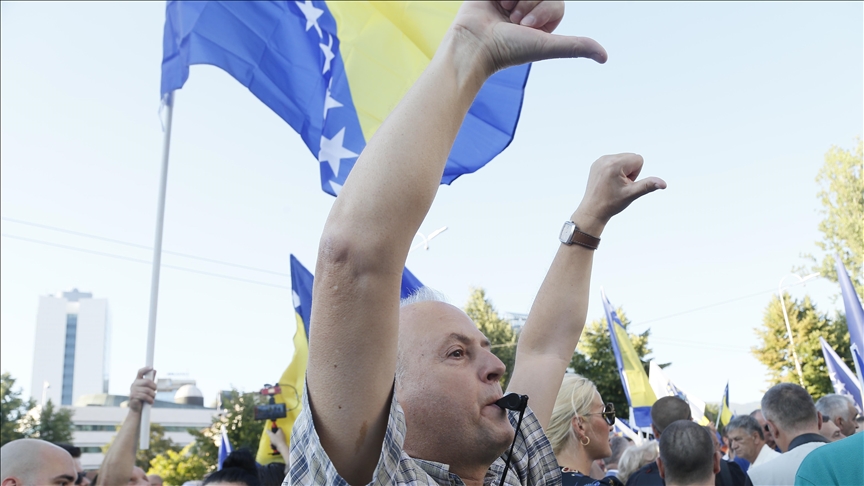Thousands in Bosnia protest possible changes to election law
Protesters argue that solutions rooted in ethnic discrimination violate democratic and legal principles

BELGRADE, Serbia
Thousands of people gathered in Sarajevo on Monday to protest proposed amendments to Bosnia and Herzegovina’s election law and constitution, which are being considered by the Office of the High Representative (OHR).
The demonstration, organized by a coalition of political parties and civil society groups, was held in front of the OHR’s office to voice opposition to solutions they claim would perpetuate ethnic discrimination and undermine democratic principles.
Among the protestors was Dervo Sejdic, a Bosnian Roma who had previously taken his case to the European Court of Human Rights in Strasbourg after being blocked from running for office due to his ethnicity.
Sejdic called for protests against the planned changes, which he argued would entrench divisions along ethnic lines.
Political parties from across Bosnia, including the Social Democratic Party (SDP), Democratic Front (DF), and the People and Justice (NiP) party, rallied behind the protest.
Demonstrators carried the national flag of Bosnia and Herzegovina, and the gathering remained peaceful, with no incidents reported.
Bakir Izetbegovic, leader of the Bosniak-majority Democratic Action Party (SDA), defended the need for a high representative to safeguard the constitution and the Dayton Peace Agreement, which ended the Bosnian War in 1995.
Izetbegovic’s comments came after an extraordinary meeting of his party, which preceded the protest.
He emphasized that the high representative should not impose solutions in areas of ethnic and political balance that were not achieved through negotiation.
"The high representative's role is to protect the Constitution and the Dayton Peace Agreement, not to impose solutions where negotiations have failed," Izetbegovic said.
Meanwhile, Croatian Prime Minister Andrej Plenkovic, visiting Bosnia, expressed support for the proposed reforms, arguing that a stable and democratic Bosnia, in which Croats are treated equally, is in Croatia’s interest.
"It is natural that Croats, who fought for Bosnia’s independence, should be able to participate in government," Plenkovic stated, following talks with Dragan Covic, the leader of the Croatian Democratic Union (HDZ), the main Bosnian Croat party.
For his part, Covic accused Bosniak parties of resisting reforms and attempting to maintain the status quo.
He indicated that a compromise solution, backed by the OHR, was necessary to ensure a democratic atmosphere during the election campaign.
Christian Schmidt, the High Representative, is also expected to use some force to impose a new law governing how delegates are chosen in the House of Peoples of the Bosniak-Croat Federation’s parliament, local media reported.
This would be the third time Schmidt uses the so-called “Bonn powers” after assuming office in August 2021.
The first time he did so to annul a law on immovable property in Republika Srpska, a Serb-dominated entity.
The second time, Schmidt used his "Bonn powers" to finance the country’s general elections on Oct. 2, allocating €6.5 million (approximately $6.97 million) for the Central Election Commission.
Anadolu Agency website contains only a portion of the news stories offered to subscribers in the AA News Broadcasting System (HAS), and in summarized form. Please contact us for subscription options.

